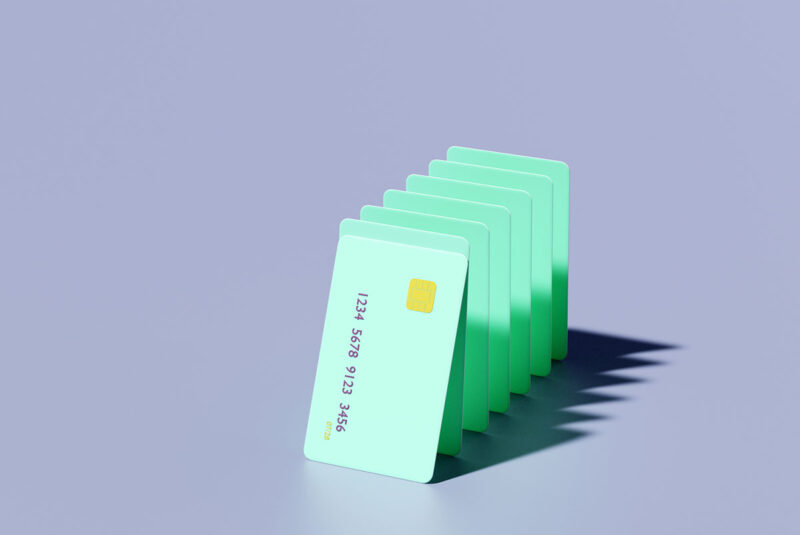Finding the right credit card can be daunting.
There are secured cards, rewards cards, cards so exclusive you can’t even apply for them; there are cards aimed at cooking fanatics, lounge junkies, and small business owners.
So if you’re overwhelmed by the question “what credit card should I get?” — it’s no wonder! But we’re here to help. Keep reading for our tips on choosing a credit card that meets all your needs.
The Best Credit Cards in Every Category
In a hurry? Don’t want to read a bunch of advice? Here’s a quick rundown of our favorite cards for every type of cardholder.
| Best For | Card | Annual Fee |
| No Credit | Capital One Platinum Credit Card | $0 |
| Rebuilding Credit | Discover it® Secured | $0 |
| Students | Journey Student Rewards from Capital One | $0 |
| Balance Transfers | None | |
| 0% Introductory APR | Capital One Quicksilver Cash Rewards Credit Card | $0 |
| Flat-Rate Cash Back | None | |
| Cash Back Bonus Categories | Chase Freedom Flex℠ | $0 |
| U.S. Supermarkets and U.S. Gas Stations | Blue Cash Everyday® Card from American Express | $0 |
| Basic Travel Rewards | Chase Sapphire Preferred® Card | $95 |
| Frequent Travelers | Chase Sapphire Reserve® | $550 |
| Airport Lounge Access | The Platinum Card® from American Express | $695 |
| Business Owners | Ink Business Cash® Credit Card | $0 |
You’ll see several different credit card companies represented here. That’s because we generally don’t recommend shopping for credit cards based on their issuer, but instead based on their fees and rewards.
When you visit MoneyTips, we want you to know that you can trust what’s in front of you. We are an authoritative source of accurate and relevant financial guidance. When MoneyTips content contains a link to partner or sponsor affiliated content, we’ll clearly indicate where that happens. Any opinions, analyses, reviews or recommendations expressed in our content are of the author alone, and have not been reviewed, approved or otherwise endorsed by the advertiser.
We make every effort to provide up-to-date information; however, we do not guarantee the accuracy of the information presented. Consumers should verify terms and conditions with the institution providing the products. Some articles may contain sponsored content, content about affiliated entities or content about clients in the network. While reasonable efforts are made to maintain accurate information, the information is presented without warranty.
3 Steps to Deciding What Credit Card You Should Get
Want a deeper review of how to choose a credit card? You’ve come to the right place. Here are three steps that will help you find the the credit card that’s best for you.
1. Check your credit scores
Since there’s no point in pining for cards for which you’ll never be approved, you should first check your credit scores.
Your credit scores are based on your credit reports and credit history. If you’ve never taken out any type of credit before — an auto or student loan, for instance — then you may not have a credit file yet.
In this case, you may need to go with a starter credit card that helps you build your credit from the ground up.
If you’ve already had credit before, but have made some mistakes, then you might see your credit scores are pretty low. You may need to go with a card that helps you rebuild credit.
If you’ve already demonstrated responsible use of credit, then you might discover you have great scores. At this point, a dizzying array of cards will be available to you.
Although it might seem counterintuitive, credit cards are one of the smartest ways to rebuild credit. Each time you pay your monthly bill on time, that behavior is reported to the major credit bureaus, helping you raise your scores. If you have bad credit, you should consider applying for a secured credit card. Because they require a security deposit — which, in most cases, then serves as your credit line — they are more amenable to people with checkered credit histories.
2. Determine why you want a credit card
Next up: Figure out which type of credit card you need. Here’s a glance at some of the most popular categories.
- Secured cards for people with bad credit
- Starter cards for those with no credit
- Student cards for folks in school
- Balance transfer cards for moving a balance from another credit card or account
- 0% intro APR cards for financing large purchases over 12–18 months
- Cash back cards for earning cash rewards on everyday purchases
- Travel rewards cards for earning points toward free airfare and hotel stays
- Business credit cards for entrepreneurs
3. Do your research
Once you’re armed with your credit scores and preferred card type, you can dive into card research. Here are some of the main qualities you’ll want to assess:
Fees
How much does the card charge for the privilege of holding it? If it’s your first credit card, we recommend looking for one with no annual fee (and not one that just waives it the first year).
That way, you’ll be able to keep it forever, continuing to raise your average length of accounts — an important component in your credit scores.
If you’re planning to travel abroad, you should also look for a card with no foreign transaction fees.
As for late fees, we’d advise setting up automatic bill pay so you never have to worry about ’em.
Purchase APR
This is the interest rate you’ll pay on your purchases, and it’s important if you plan to carry a balance on your card.
The best strategy, however, is to pay your statement balance in full each month; since most cards offer a “grace period,” that means you’ll never pay any interest on your purchases.
If you must carry a balance — say, because you need a new fridge but don’t have the money quite yet — you should look for a card with a 0% introductory APR. You can put the fridge on the card and pay it off slowly over the promotional period (usually 12–18 months), allowing you to finance its purchase interest-free.
Balance transfer APR
If you already have credit card debt — and are drowning in interest charges — you should consider transferring the balance to another credit card. The best cards for this purpose have no balance transfer fees and a 0% APR.
Rewards
Besides building credit, the best part about using credit cards is the rewards you can earn.
While there aren’t many rewards cards targeted at people with poor or limited credit, you may be able to find some: The Discover it® Secured card, for example, offers 2% cash back at gas stations and restaurants (up to $1,000 spent per quarter).
On the other hand, if you have good to excellent credit, you’ll have an abundance of options — in which case it’s important to make sure the bonus categories align with your spending habits.
If you rarely dine out, look for a card that earns bonus points at grocery stores (and not restaurants). If you rarely travel, look for a cash back card that earns statement credits rather than a travel card that earns frequent flyer miles.
Another factor to consider is the signup bonus. Some cards offer a certain amount of cash back rewards (say, $500) or points (say, 50,000) if you spend a certain amount (usually between $500 and $5,000) in the first three months of opening the account. When comparing bonuses, make sure the minimum spend is within your budget, as you should never go into debt to earn rewards.
Perks
Lastly, it’s time to examine the fun perks and features that each card offers.
If you’re in school, for example, the Discover it® Student Cash Back offers a $20 statement credit each year your GPA is 3.0 or higher.
Alternatively, the Journey Student Rewards from Capital One will automatically consider you for a credit limit increase after your first six months. Since available credit is an important element in your credit scores, this is a noteworthy advantage.
Certain premium travel credit cards, like the Capital One Venture Rewards Credit Card, Chase Sapphire Reserve®, and The Platinum Card® from American Express even offer an application fee credit for Global Entry/TSA PreCheck, in addition to airport lounge access and other fancy perks.
If you’re not sure which cards you’d qualify for, you can check for pre-approved offers from reputable credit card issuers. Doing so will require a soft credit pull, which won’t affect your scores. Though you’re not guaranteed to get a card for which you’re prequalified, it’s a more targeted way of determining which credit card you should get.
What’s the Best Credit Card for Me?
Wondering how to pick a credit card? The truth is there’s no “perfect card.” So, eventually, you’ll just have to go for it.
If it’s your first time using credit, we’d simply advise you to go slow. Practice using credit by only charging what you can afford to pay off each month — and never break your budget just to earn rewards.
After getting your new credit card, the most important thing is to use it responsibly: Strive to pay your statement balances in full, and always, always make your monthly payments on time. Doing so can boost your creditworthiness and open you up to more and more credit card options.
While the answer to “what credit card should I get?” depends wholly on your needs, there’s undoubtedly a card out there for you. All you have to know is where to look.
| Best For | Card | Annual Fee |
| No Credit | Capital One Platinum Credit Card | $0 |
| Rebuilding Credit | Discover it® Secured | $0 |
| Students | Journey Student Rewards from Capital One | $0 |
| Balance Transfers | None | |
| 0% Introductory APR | Capital One Quicksilver Cash Rewards Credit Card | $0 |
| Flat-Rate Cash Back | None | |
| Cash Back Bonus Categories | Chase Freedom Flex℠ | $0 |
| U.S. Supermarkets and U.S. Gas Stations | Blue Cash Everyday® Card from American Express | $0 |
| Basic Travel Rewards | Chase Sapphire Preferred® Card | $95 |
| Frequent Travelers | Chase Sapphire Reserve® | $550 |
| Airport Lounge Access | The Platinum Card® from American Express | $695 |
| Business Owners | Ink Business Cash® Credit Card | $0 |



